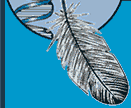OPPOSE THE GENOGRAPHIC PROJECT
The Genographic Project proposes to take over 100,000 blood samples and historical knowledge from Indigenous peoples around the world. It is a collaborative project of the National Geographic Society, IBM Corporation, and the Waitt Family Foundation (Gateway Computer funds).
Why Oppose the Genographic Project?
It is Exploitive, Unethical Research
They will take the blood or other bodily tissue samples for their own use, to further their own research on human history, with no potential benefits from that research for Indigenous peoples. The GP expects to get full informed consent in 20 minutes from Indigenous participants! If an Indigenous person consents to participate in the GP, the informed consent form requires them to consent to have their samples available for future human migration studies. Indigenous peoples will bear all the risks in this research.
It May Ignore and/or Discount Indigenous Knowledge & Undermine Our Rights
They will tell you who you are and where you come from, ignoring existing Indigenous knowledge about ourselves. In fact, their informed consent form states: “It is possible that some of findings that result from this study may contradict an oral, written, or other traditional held by you or by members of your group.” Despite the speculative nature of genetic research on human histories, these findings could be used to undermine “indigenousness” or “aboriginality” of Indigenous peoples and our rights as the original inhabitants of our territories.
It Will Promote Research on the Ancestors
This research promotes the destructive analysis of genetic material taken from the bodies of our deceased ancestors and attempt to compare them to modern populations. The ancestors bodies are sacred and should not be desecrated in the name of scientific curiosity.
Indigenous Blood is not for sale
The GP is trying to induce Indigenous peoples to participate in the Project by establishing “The Legacy Fund,” which proposes to donate money to Indigenous peoples’ cultural preservation projects. There is no connection between preserving blood and perpetuating Indigenous culture. Our blood is sacred, inalienable and not for sale.
It is a Continuation of the Human Genome Diversity Project
In the 1990s, Indigenous peoples around the world built a worldwide movement opposing the Human Genome Diversity Project, which came to be known as the Vampire Project because it sought to collect blood from 700 different Indigenous communities. The HGDP failed to consult with Indigenous peoples, and didn’t anticipate Indigenous peoples’ strong opposition to its project. The HGDP also failed to gain support from UNESCO and from the United States’ government. The Genographic Project is the Vampire Project revamped, but with much larger impact, proposing to take 100,000 samples and construct a database of genetic information derived from the samples and oral histories of Indigenous peoples.
For more Information: www.ipcb.org/issues/human_genetics
Genographic Project Regional Research Centers
The GP is conducting research through 10 regional centers around the world. The principal investigators and host institutions are listed below:
East/Southeast Asia North Eurasia
Li Jin, Ph.D. Elena Balanovska , Ph.D.
Center for Anthropological Studies Laboratory of Human Population Genetics
School of Life Sciences Research Centre for Medical Genetics
Fudan University Moscow (Russia)
Shanghai (China)
India Middle East/North Africa
Ramasamy Pitchappan, Ph.D. Pierre Zalloua, Ph.D.
Centre for Excellence in Genomic Sciences Department of Internal Medicine & Ob/Gyn
Madurai Kamaraj University American University of Beirut
Tamil Nadu (India) Beirut (Lebanon)
North America South America
Theodore Schurr, Ph.D. Fabricio Santos, Ph.D.
Laboratory of Molecular Anthropology Institute of Biological Sciences
University of Pennsylvania Universidade Federal de Minas Gerais
Philadelphia (USA) Minas Gerais (Brazil)
Sub-Saharan Africa Western/Central Europe: Y Chromosome
Himla Soodyall, Ph.D. Chris Tyler-Smith, Ph.D.
Human Genomic Diversity/Disease Research The Wellcome Trust Sanger Institute
National Health Laboratory Service Cambridge (UK)
University of Witwatersrand
Johannesburg (South Africa)
Western/Central Europe: Mitochondrial DNA Australia/Pacific
Lluis Quintana-Murci, Ph.D. Robert John Mitchell, Ph.D.
Unit of Molecular Prevention/Therapy of Human Diseases Department of Genetics
Institut Pasteur LaTrobe University
Paris (France) Melbourne (Australia)
Ancient DNA
Alan Cooper, Ph.D.
Division of Earth & Environmental Sciences
University of Adelaide
Adelaide (Australia)
Advisory Board Members:
Indigenous Advocate: Tammy Williams
Director of Indigenous Enterprise Partnerships
Cape York, Queensland, Australia
FOR MORE INFORMATION, please visit www.ipcb.org or email ipcb@ipcb.org
|







